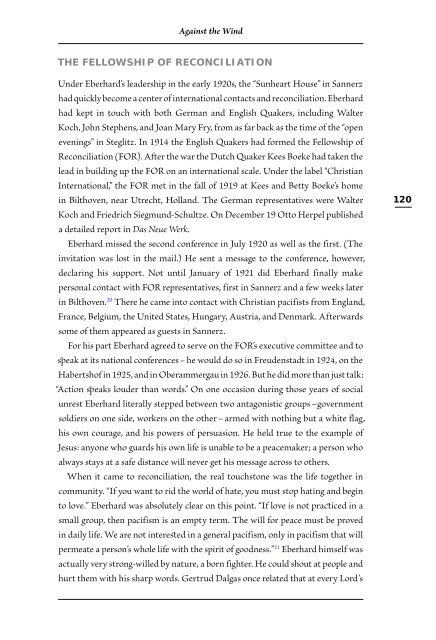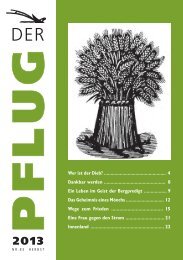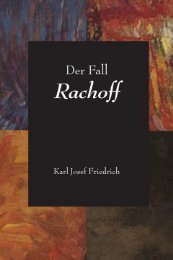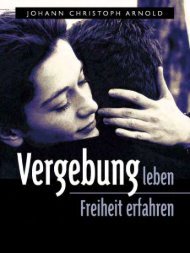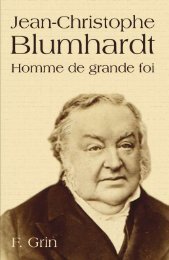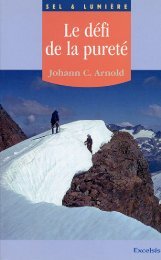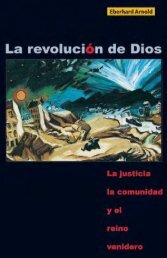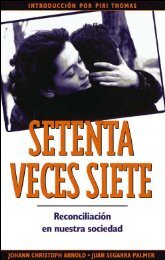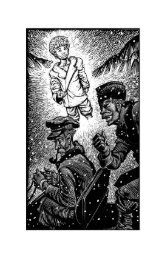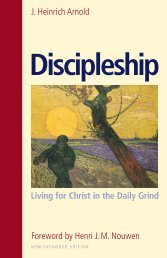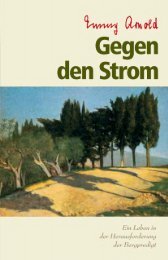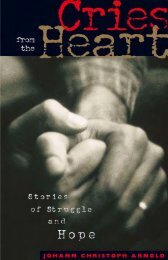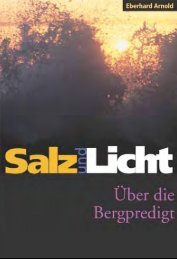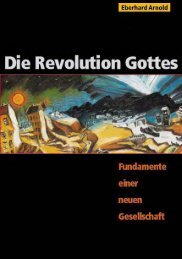Against the Wind: Eberhard Arnold and the Bruderhof - Plough
Against the Wind: Eberhard Arnold and the Bruderhof - Plough
Against the Wind: Eberhard Arnold and the Bruderhof - Plough
Create successful ePaper yourself
Turn your PDF publications into a flip-book with our unique Google optimized e-Paper software.
<strong>Against</strong> <strong>the</strong> <strong>Wind</strong><br />
thE fEllowShip of rEConCiliation<br />
Under <strong>Eberhard</strong>’s leadership in <strong>the</strong> early 1920s, <strong>the</strong> “Sunheart House” in Sannerz<br />
had quickly become a center of international contacts <strong>and</strong> reconciliation. <strong>Eberhard</strong><br />
had kept in touch with both German <strong>and</strong> English Quakers, including Walter<br />
Koch, John Stephens, <strong>and</strong> Joan Mary Fry, from as far back as <strong>the</strong> time of <strong>the</strong> “open<br />
evenings” in Steglitz. In 1914 <strong>the</strong> English Quakers had formed <strong>the</strong> Fellowship of<br />
Reconciliation (FOR). After <strong>the</strong> war <strong>the</strong> Dutch Quaker Kees Boeke had taken <strong>the</strong><br />
lead in building up <strong>the</strong> FOR on an international scale. Under <strong>the</strong> label “Christian<br />
International,” <strong>the</strong> FOR met in <strong>the</strong> fall of 1919 at Kees <strong>and</strong> Betty Boeke’s home<br />
in Bilthoven, near Utrecht, Holl<strong>and</strong>. The German representatives were Walter 120<br />
Koch <strong>and</strong> Friedrich Siegmund-Schultze. On December 19 Otto Herpel published<br />
a detailed report in Das Neue Werk.<br />
<strong>Eberhard</strong> missed <strong>the</strong> second conference in July 1920 as well as <strong>the</strong> first. (The<br />
invitation was lost in <strong>the</strong> mail.) He sent a message to <strong>the</strong> conference, however,<br />
declaring his support. Not until January of 1921 did <strong>Eberhard</strong> finally make<br />
personal contact with FOR representatives, first in Sannerz <strong>and</strong> a few weeks later<br />
in Bilthoven. 20 There he came into contact with Christian pacifists from Engl<strong>and</strong>,<br />
France, Belgium, <strong>the</strong> United States, Hungary, Austria, <strong>and</strong> Denmark. Afterwards<br />
some of <strong>the</strong>m appeared as guests in Sannerz.<br />
For his part <strong>Eberhard</strong> agreed to serve on <strong>the</strong> FOR’s executive committee <strong>and</strong> to<br />
seak at its national conferences – he would do so in Freudenstadt in 1924, on <strong>the</strong><br />
Habertshof in 1925, <strong>and</strong> in Oberammergau in 1926. But he did more than just talk:<br />
“Action seaks louder than words.” On one occasion during those years of social<br />
unrest <strong>Eberhard</strong> literally stepped between two antagonistic groups –government<br />
soldiers on one side, workers on <strong>the</strong> o<strong>the</strong>r – armed with nothing but a white flag,<br />
his own courage, <strong>and</strong> his powers of persuasion. He held true to <strong>the</strong> example of<br />
Jesus: anyone who guards his own life is unable to be a peacemaker; a person who<br />
always stays at a safe distance will never get his message across to o<strong>the</strong>rs.<br />
When it came to reconciliation, <strong>the</strong> real touchstone was <strong>the</strong> life toge<strong>the</strong>r in<br />
community. “If you want to rid <strong>the</strong> world of hate, you must stop hating <strong>and</strong> begin<br />
to love.” <strong>Eberhard</strong> was absolutely clear on this point. “If love is not praciced in a<br />
small group, <strong>the</strong>n pacifism is an empty term. The will for peace must be proved<br />
in daily life. We are not interesed in a general pacifism, only in pacifism that will<br />
permeate a person’s whole life with <strong>the</strong> spirit of goodness.” 21 <strong>Eberhard</strong> himself was<br />
actually very strong-willed by nature, a born fighter. He could shout at people <strong>and</strong><br />
hurt <strong>the</strong>m with his sharp words. Gertrud Dalgas once related that at every Lord’s


